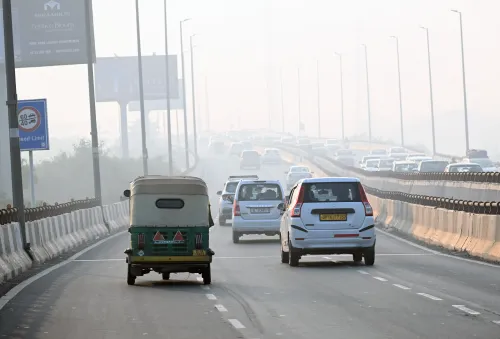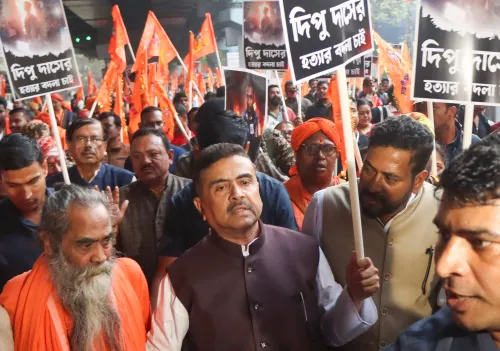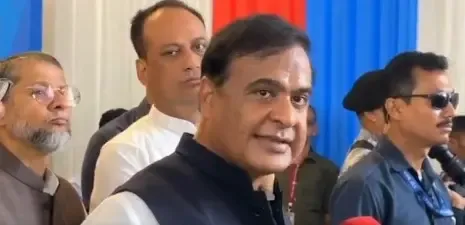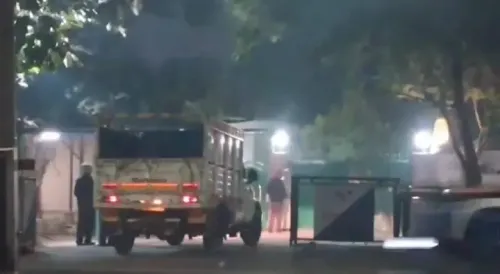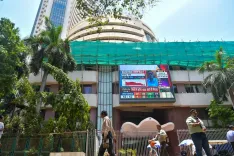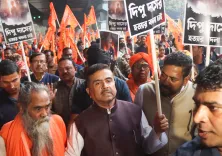Will the Congress-Left Front Reach a Seat-Sharing Agreement for the 2026 Bengal Assembly Elections?

Synopsis
Key Takeaways
- Seat-sharing negotiations are crucial for the upcoming elections.
- The absence of key leaders poses challenges.
- Internal party dynamics may affect collaboration.
- Regional allies' willingness to compromise is vital.
- Political observers are closely monitoring the situation.
Kolkata, June 30 (NationPress) With less than a year remaining until the pivotal West Bengal Assembly elections, the formal process to establish a smooth seat-sharing agreement between the Congress and Left Front is set to commence. Both factions are currently shifting the responsibility for initiating these discussions onto each other.
Historically, the blueprint for seat-sharing agreements has been drafted well over a year prior to elections, as seen in the 2021 West Bengal Assembly elections and the upcoming 2024 Lok Sabha polls.
Political analysts believe that the challenges for achieving a seamless seat-sharing agreement this time around are numerous.
The first challenge is the lack of the two key figures who previously orchestrated successful seat-sharing arrangements: the late former CPI-M General Secretary Sitaram Yechury and the former State Congress President and Lok Sabha member Adhir Ranjan Chowdhury.
Prior to his untimely passing last year, Yechury had effectively navigated opposition from strong anti-Congress factions within his party, particularly the Kerala lobby, to facilitate a cooperative seat-sharing agreement with Congress in both West Bengal and Kerala.
“Yechury was adept at persuading the hardliners that the political landscape in Kerala, where Congress was the primary rival, significantly differed from that in West Bengal, where the Trinamool Congress and BJP posed the main challenges. Therefore, tailored strategies were essential for each state. However, the current central leadership of our party is predominantly hardline and resistant to any collaboration with Congress nationwide. As a result, discussions for a seamless seat-sharing agreement have yet to commence,” stated a member of the CPI-M state committee in West Bengal.
In Congress, Adhir Ranjan Chowdhury was pivotal in fostering the seat-sharing agreements with the Left Front in both 2021 and 2024, maintaining a conciliatory stance towards the CPI-M while being staunchly opposed to the Trinamool Congress and Mamata Banerjee.
However, his successor, Subhankar Sarkar, is perceived as a leader inclined to align with the party's central command, which favors a functional relationship with the Trinamool Congress.
On one side, a CPI-M Politburo member and the West Bengal party's secretary have made it clear that the decision for a seat-sharing agreement rests with Congress for the 2025 Assembly polls.
Conversely, Sarkar has remained silent on the topic, instead emphasizing the importance of strengthening Congress's organizational network within West Bengal rather than relying on alliances for electoral success.
The second challenge involves potential hesitance from other Left Front allies, particularly the All India Forward Bloc and Revolutionary Socialist Party (RSP), to relinquish their traditional seats to support any Congress candidate.
During the recent by-elections for the Kaliganj Assembly constituency in Nadia district, CPI-M leadership struggled to persuade RSP to forgo their claim in favor of Congress candidate Kabil Uddin Shaikh.
“While RSP agreed to step back for the Kaliganj by-elections, they indicated that they plan to field their candidate from Kaliganj in 2026. Meanwhile, the Forward Bloc has consistently opposed any collaboration with Congress. In 2024, the seat-sharing agreement faltered in areas where the Forward Bloc fielded candidates against the consensus of the united Left Front leadership,” remarked a member of the CPI-M state committee.


